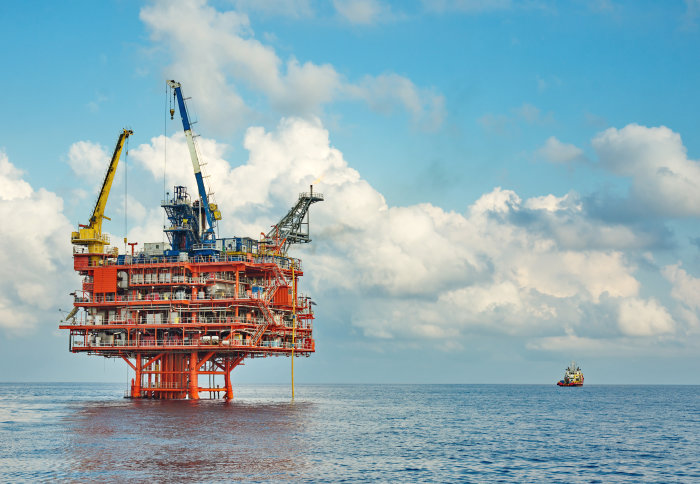Why did oil prices fall below zero? Analysis from Imperial experts

Experts from Imperial have provided analysis of the global downturn in the price of oil.
The COVID-19 induced turmoil included US oil prices turning negative for the first time in history on 21 April. The price of a barrel of West Texas Intermediate (WTI) – the benchmark for US oil – fell as low as minus $37.63 a barrel. Buyers were essentially being paid to receive oil.
Researchers and academics from across Imperial College London have provided analysis of this global economic impact of coronavirus.
Market moves revived claims that ‘data is the new oil’ as the coronavirus-related events caused Netflix’s market capitalisation to exceed that of oil giant ExxonMobil.
Global glut of oil
Dr Alex Koberle, Research Fellow at the Grantham Institute – Climate Change and the Environment said: “Oil prices are likely to remain low due to the drop in demand, but the negative oil prices are likely to be transient for several reasons. First, they are a result of specific market issues. North America saw negative oil prices in the West Texas intermediate (WTI) index largely because contracts for delivery the following month close on the 20th of each month, and on Monday there were only sellers in the market and no buyers. With no space left to store oil that had already been produced, traders were paying others to take it off their hands. The European prices, based on the Brent index, did not go negative because those contracts for next-month delivery close on the 30th, so this situation is yet to play out.
North America saw negative oil prices because contracts for delivery the following month close on the 20th […] there were only sellers in the market and no buyers Dr Alex Koberle Research Fellow at the Grantham Institute
“WTI prices are already rebounding as traders are now paying for contracts that deliver oil for June, with prices being around $20-25. This suggests traders are expecting demand to rebound or supply to shrink in the coming weeks. But that is very uncertain. The price war and lack of cooperation between the United States, Russia and Saudi Arabia that is happening in the midst of crashing oil demand caused by the COVID-19 pandemic has resulted in a global glut of oil. Furthermore, although several producers have announced that they will begin to shut their wells, many are unlikely to return to production due to geological reasons. So, while Monday’s negative prices are likely to be transitory at least for now, a return to high oil prices is uncertain in the short-term.”
Time to adjust
Richard Green, Professor of Sustainable Energy Business at Imperial College Business School said: “The oil market has just seen what quite often happens in electricity – if you really want to deliver your product (since oil wells, like some power stations, are hard to turn off) but the buyers really don't want it (because it's always hard to store electricity, and the oil storage in Oklahoma is filling up rapidly), the price ends up negative until someone has time to adjust."
Consequences that ripple through the economy
Dr Koberle added: “So what will happen? That is a longer story subject to many variables, including the falling cost of renewable energy like solar and wind power, energy storage batteries and electric vehicles; expectations about future consumer behaviour (e.g. will people return to frequent business flights or will international meetings be replaced by videoconferencing?), and jousting for market share among big oil producers (e.g. OPEC+ Versus US shale gas). Some say oil will never rebound. Others will point to previous crashes and say oil crashed and recovered before, so it may do the same again.

"One thing is certain: current financial exposure to oil prices is high among financial institutions (banks, central banks, asset managers, pension funds etc.) and the crash in the oil price has immediately turned many loans sour (having a high probability not being repaid) due to the oil producers being over-leveraged (in too much debt). This has consequences that ripple through the economy and may force governments to bail out many of these financial firms again, as they did following the 2008 financial crash.”
Significant long-term impact
Anna Korre, Professor of Environmental Engineering and Co-Director, Energy Futures Lab said: “The collapse in oil prices could potentially have a significant long-term impact on the energy sector, and by extension the climate, by accelerating the transition the oil and gas industry is undergoing.
“Companies with oil-loaded portfolios are most heavily exposed to the financial impact of this week’s price collapse and if demand remains low for a number of months, some of these may face severe financial difficulties.
“The companies best-placed to withstand the current crisis are the ones that have pursued the most progressive long-term strategies – those with gas-rich portfolios and those that have been making substantial investments in renewables and innovation.

“Oil and gas producers that are responding to the decarbonisation challenge by diversifying can hope to be sheltered from the worst of the storm through their access to alternative revenue sources, proving that what is best for the planet is also best for the industry. They can also hope that some of their innovative ventures may secure them a prosperous future.
“In the coming months, clean growth must be at the forefront of the economic recovery. Only companies that are addressing their carbon emissions and striving for a sustainable energy future should be publicly supported in that process. It may be a blessing for the planet that companies which have been slow to diversify and decarbonise are forced to change or break down.”
Market blip
Dr Adam Hawkes, Director of the Sustainable Gas Institute added: “The fall in oil prices is very likely a market blip, driven by very specific short-term circumstances. As the world recovers from the crisis, it will be important not to be distracted by cheap oil, and to continue to direct investment and stimulus towards energy options consistent with achieving Paris Agreement goals.”
Article text (excluding photos or graphics) © Imperial College London.
Photos and graphics subject to third party copyright used with permission or © Imperial College London.
Reporter
Joanna Wilson
Communications Division